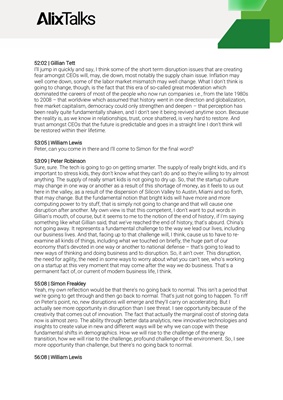
52:02 | Gillian Tett
I'll jump in quickly and say, I think some of the short term disruption issues that are creating
fear amongst CEOs will, may, die down, most notably the supply chain issue. Inflation may
well come down, some of the labor market mismatch may well change. What I don't think is
going to change, though, is the fact that this era of so-called great moderation which
dominated the careers of most of the people who now run companies i.e., from the late 1980s
to 2008 - that worldview which assumed that history went in one direction and globalization,
free market capitalism, democracy could only strengthen and deepen - that perception has
been really quite fundamentally shaken, and I don't see it being revived anytime soon. Because
the reality is, as we know in relationships, trust, once shattered, is very hard to restore. And
trust amongst CEOs that the future is predictable and goes in a straight line I don't think will
be restored within their lifetime.
53:05 | William Lewis
Peter, can you come in there and I'll come to Simon for the final word?
53:09 | Peter Robinson
Sure, sure. The tech is going to go on getting smarter. The supply of really bright kids, and it's
important to stress kids, they don't know what they can't do and so they're willing to try almost
anything. The supply of really smart kids is not going to dry up. So, that the startup culture
may change in one way or another as a result of this shortage of money, as it feels to us out
here in the valley, as a result of the dispersion of Silicon Valley to Austin, Miami and so forth,
that may change. But the fundamental notion that bright kids will have more and more
computing power to try stuff, that is simply not going to change and that will cause one
disruption after another. My own view is that this competent, I don't want to put words in
Gillian's mouth, of course, but it seems to me to the notion of the end of history, if I'm saying
something like what Gillian said, that we've reached the end of history, that's absurd. China's
not going away. It represents a fundamental challenge to the way we lead our lives, including
our business lives. And that, facing up to that challenge will, I think, cause us to have to reexamine
all kinds of things, including what we touched on briefly, the huge part of our
economy that's devoted in one way or another to national defense - that's going to lead to
new ways of thinking and doing business and to disruption. So, it ain't over. This disruption,
the need for agility, the need in some ways to worry about what you can't see, who's working
on a startup at this very moment that may come after the way we do business. That's a
permanent fact of, or current of modern business life, I think.
55:08 | Simon Freakley
Yeah, my own reflection would be that there's no going back to normal. This isn't a period that
we're going to get through and then go back to normal. That's just not going to happen. To riff
on Peter's point, no, new disruptions will emerge and they'll carry on accelerating. But I
actually see more opportunity in disruption than I see threat. I see opportunity because of the
creativity that comes out of innovation. The fact that actually the marginal cost of storing data
now is almost zero. The ability through better data analytics, new innovative technologies and
insights to create value in new and different ways will be why we can cope with these
fundamental shifts in demographics. How we will rise to the challenge of the energy
transition, how we will rise to the challenge, profound challenge of the environment. So, I see
more opportunity than challenge, but there's no going back to normal.
56:08 | William Lewis